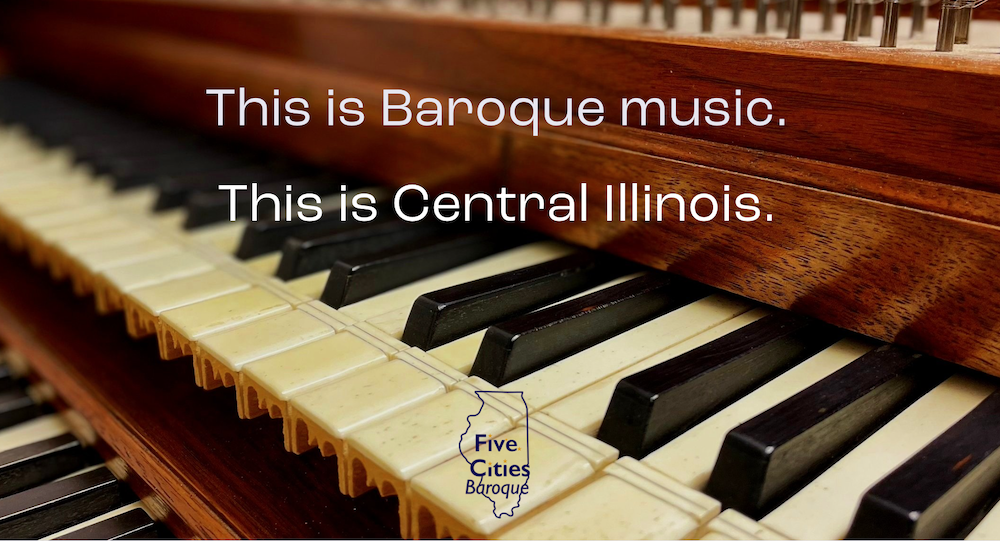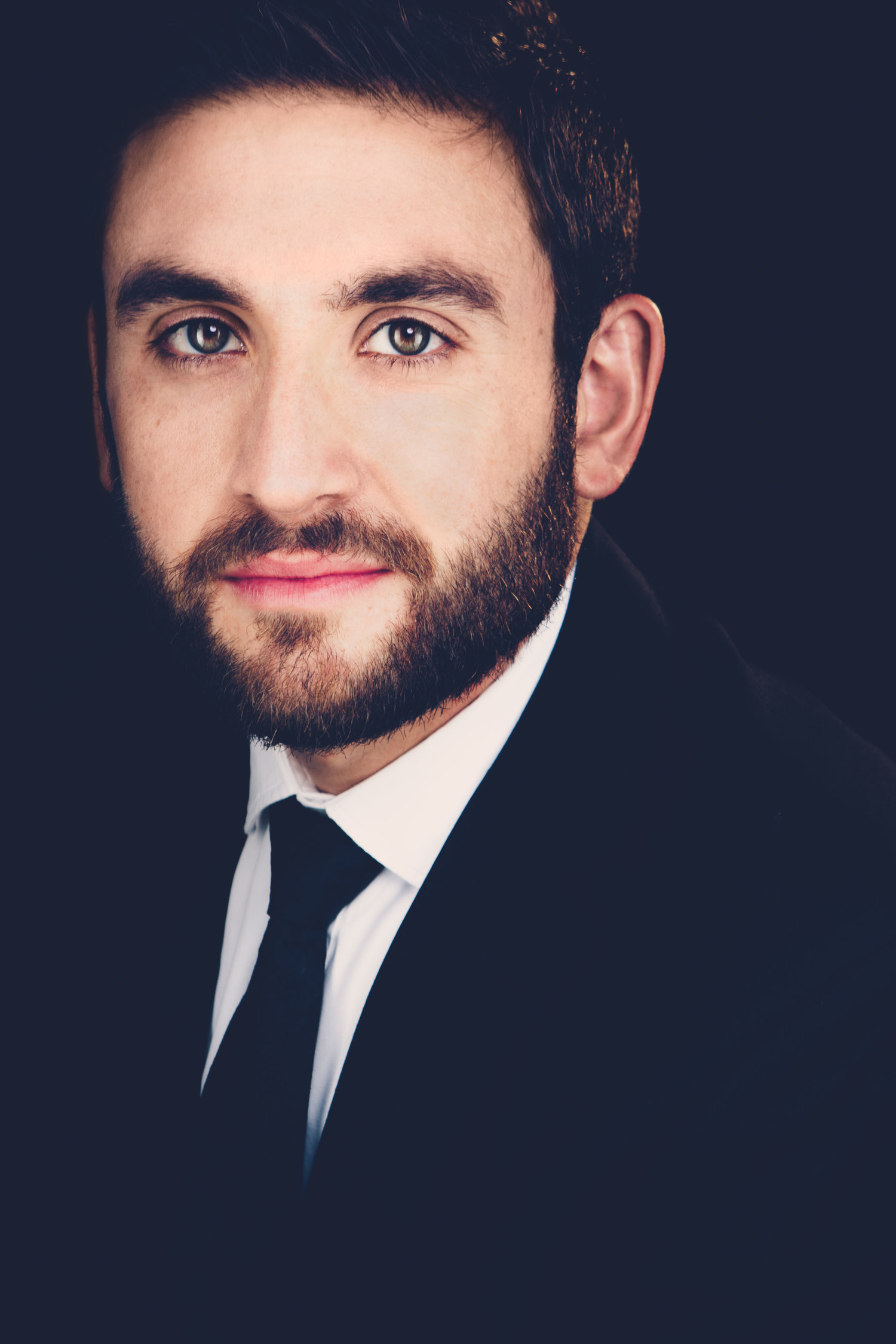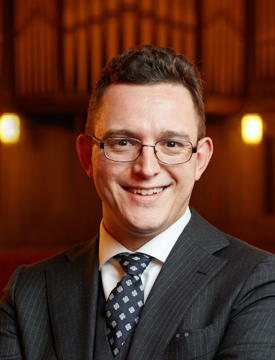Five Cities Baroque Festival Preview with Director Nate Widelitz

Meet Nate Widelitz: conductor, singer, educator, and director of the Five Cities Baroque Festival, which launches in May. The inaugural festival will assemble some of the area’s top instrumentalists and singers for a two-day exploration of Baroque music. Widelitz, a relative newcomer to the area, joined the faculty at the Millikin University School of Music last August. As Visiting Instructor of Choral Music Education, he runs two of the choirs at Millikin and teaches music education classes. He also serves as faculty advisor to the Millikin Camerata, a student-run choir that will make up the core of the festival’s chorus.
As soon as Widelitz arrived in Decatur for his interview at Millikin, he knew he wanted to start a music festival there. When he landed, he said he realized Decatur was “smack dab in the middle of this group of five small cities here in the middle of the state,” namely, Champaign-Urbana, Springfield, Decatur, Peoria, and Bloomington, each of which has its own regional orchestra and choir. “Between them, my thought was that if you gather the best people from all of these cities, you can really put together a super top-notch collection of ensembles. You just have to entice the folks to drive an hour to Decatur.” Plus, Widelitz said organizing a music festival would help “scratch some musical itches outside my work at Millikin.” With his background in early music, starting a Baroque music festival was a no-brainer.
Widelitz’s interest in early music began in college at USC’s Thornton School of Music, where he sang in the chorus of J. S. Bach’s Mass in B minor under Helmuth Rilling. “I was—as you might imagine—very taken with the music,” he recounted. “And so it became kind of an—obsession is maybe a strong word—but it became a real interest for me. And in the next couple of years, I had more and more opportunities to sing this kind of music. And the more I did it, the more I fell in love with it.”

Nate Widelitz, director of the Five Cities Baroque Festival
Widelitz continued to pursue his interest in early music at the Yale School of Music, where he earned his Master of Music in Choral Conducting. After spending a year in Sofia, Bulgaria researching Bulgarian folk music on a Fulbright scholarship, he returned to Yale to pursue a Doctor of Musical Arts in Choral Conducting in 2020.
The Five Cities Baroque Festival will bring together top musicians from around central Illinois. For the Festival Orchestra, Widelitz is drawing from the rosters of the area’s regional orchestras, such as the Illinois Symphony Orchestra, Champaign-Urbana Symphony Orchestra, and Millikin–Decatur Symphony Orchestra, and music faculty from local universities, including the University of Illinois Urbana-Champaign, the University of Illinois Springfield, Illinois State University, Illinois Wesleyan University, and Millikin University.
In addition to mounting world-class performances, the festival has an educational component. “Education is actually one of our central missions,” Widelitz explained. “We’re starting this year by incluing a number of Millikin students in the chorus. I hope the experience of singing side-by-side with some leading professional singers in the field will be deeply instructive to them. Also, Baroque music does not currently have a very prominent place here at this institution, so exposing the students to both the literature and, perhaps even more importantly, the style, I hope will really open their eyes to this era of music in the same way that Rilling’s visit to USC did for me.”
Widelitz hopes the educational aspect of the festival will continue to grow in future seasons. “One of my major goals for next year is to expand the festival to have a high school division… where perhaps we’d perform a Mozart Requiem or a Marianna Martines Mass, for instance,” he said.

Organist Stephen Buzard will open the festival
The festival will begin on Friday, May 19, with the organ works of J. S. Bach in a recital by Urbana-native Stephen Buzard. Currently Director of Music at St. James Cathedral in Chicago, Buzard performs across the United States and internationally and is the winner of several competitions. Prior to his work in Chicago, Stephen served as Acting Director of Music and Organist at Saint Thomas Church Fifth Avenue in New York City. He and Widelitz met while they were both studying at Yale. The program, titled "The Bach Reader," will involve a narrator reading firsthand accounts of Bach’s life interspersed with some of his greatest organ music.
On Saturday afternoon, the Festival Orchestra will come together for a concert of chamber music. Expanding the traditional definition of “Baroque” music to include Early Classical selections, the concert will begin with Joseph Bologne’s Violin Concerto No. 9. The program will also include a trio sonata by Élisabeth Jacquet de la Guerre. In addition to these lesser-known works, the concert will feature hallmarks of the Baroque repertoire, including Bach’s Brandenburg Concerto No. 5, Arcangelo Corelli’s Christmas Night Concerto, and the Passacaglia from Franz Biber’s Rosary Sonatas played on the viola by William McClain, conductor of the Millikin–Decatur Symphony Orchestra.
In Saturday night’s keynote concert, the Festival Orchestra, chorus, and soloists will join forces for Bach’s Cantata 42 (“Am Abend aber desselbigen Sabbats”) and the North American premiere of Litaniae Omnium Sanctorum by Czech composer Jan Dismas Zelenka (1679–1745).
“My programming philosophy is really always the same,” Widelitz explained when asked how he approached planning the music for the festival. “No matter what I’m doing, I’m always on the search for music that I really like and that I believe holds real musical value.” He also likes to prioritize “hidden gems,” as is the case with Zelenka’s Litaniae Omnium Sanctorum, which Widelitz says has never, to his knowledge, been performed outside of Central Europe and is very little known outside the early music scene in the Czech Republic.
Widelitz was already a fan of the obscure Czech composer when he stumbled across a recording of Zelenka's Litaniae by an ensemble based out of Prague called Ensemble Inégal. “I was just immediately drawn to it,” he said. “I just had that thought to myself, ‘I have to program this.’” Finding the score was another matter. It didn’t exist on any online database or catalogue, and he had no luck on a website dedicated to the composer. He soon discovered that the only modern score in the world was in the hands of the music director of Ensemble Inégal, Adam Viktora. He reached out to Viktora, who graciously agreed to license the score to Widelitz so he could program it.
Widelitz hopes the festival will continue to grow year after year. “My hope is that this year will be successful enough to generate enough buzz that it can become self-sustaining, and that it can become a treasured part of the cultural fabric here in Decatur, and in central Illinois, and more broadly,” he said.
He believes the festival will be a long-term success, given the presence of other Baroque festivals and ensembles in the area, including the Illinois Bach Festival, Peoria Bach Festival, and the Baroque Artists of Champaign-Urbana. “This festival is not an attempt to compete with or supplant those festivals, but the existence of those festivals was kind of an indication to me that yes, people do have an appetite for [early music], and they will show up.”
His only doubt initially was finding the support to launch the festival. “I’ve been here less than a year,” he said, “but my impression is that Decatur tends to be the forgotten city. You know, Champaign certainly has a national reputation, and Springfield is the state capitol, and Peoria, of course, is a well-known city, but Decatur seems to be forgotten about sometimes. So my hesitancy was: 'Will people believe that Decatur can mount and sustain something like this?' And I am just so happy to have found out that the answer seems to be yes.”
Check out the Five Cities Baroque Festival’s website here for more information.
Festival Schedule
- Friday, May 19, 7:30 p.m. – Opening Concert: Stephen Buzard in Recital
Organist Stephen Buzard will open the 2023 Festival with a concert of music by J. S. Bach on the Baroque-style organ at Decatur First United Methodist Church. Reception to follow. Admission is free; donations will be accepted.
- Saturday, May 20, 2 p.m. – An Afternoon of Chamber Music
The Festival Orchestra will gather to give a concert of chamber music, featuring works by Joseph Bologne, Franz Biber, Élisabeth Jacquet de la Guerre, Arcangelo Corelli, and J.S. Bach, at St. John’s Episcopal Church of Decatur. Reception to follow. Admission is free; donations will be accepted.
- Saturday, May 20, 7:30 p.m. – Keynote Concert: Bach & Zelenka
The 2023 Festival will close with a performance of Bach’s Cantata 42 and the North American premiere of Jan Dismas Zelenka’s Litaniae Omnium Sanctorum, ZWV 153. Reception to follow. Admission is free; donations will be accepted.



